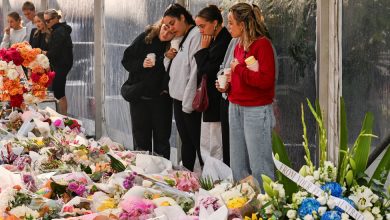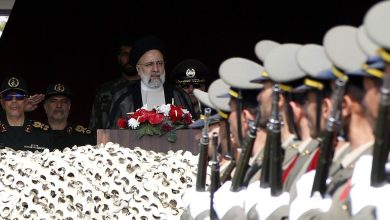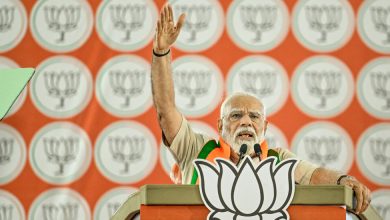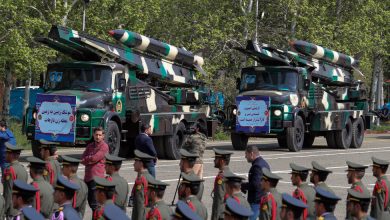A Monkeypox Vaccine Is Now Available for New Yorkers Who May Be at Risk

Facing a growing outbreak of the monkeypox virus, New York City health officials expanded access to a monkeypox vaccine on Thursday, offering it to a new group of people who may be at higher risk: men who have had multiple or anonymous male sexual partners over the last two weeks.
New York City is the first American jurisdiction to broaden access to the vaccine beyond close contacts of people infected, following similar moves in the United Kingdom and Canada.
Public health officials globally have been scrambling to craft an effective response to the outbreak, which has been spreading in dozens of countries since mid-May, particularly among networks of gay, bisexual and other men who have sex with men.
New York City reported 30 cases of the monkeypox virus as of Thursday. Nationally, 173 cases had been reported by the Centers for Disease Control and Prevention. Globally, there were more than 3,300 cases of the disease reported in 42 countries outside of the African regions where it is endemic, in the largest ever global outbreak of the disease.
No deaths have yet been reported in the outbreak outside of Africa, but 72 deaths have been reported since the start of the year in the endemic African regions.
The opening of the first clinic to offer the vaccine in New York City on Thursday was not announced publicly beforehand. Instead, after a news release went out at 11:30 a.m. Thursday, the news spread on social media and through word of mouth about the vaccine’s sudden availability.
By early afternoon, a line of more than 100 men had formed outside the city-run Chelsea Sexual Health Clinic, which is the only place in the city offering the shots.
The city had set up an online appointment system, but there were no spots available as of Thursday afternoon.
By about 1:30 p.m., workers at the clinic began to turn away new people, asking them to make appointments online for next week.
There is a limited supply of the preferred vaccine to fight monkeypox, which has been approved by the Food and Drug Administration. It is manufactured in Denmark and is known as Jynneos in the United States. Though the federal government owns about 1.4 million doses, Mark Levine, the Manhattan borough president, said that there were only about 1,000 doses of vaccine on hand for the city’s residents.
“The demand we’re seeing today is further proof of how proactive the L.G.B.T.Q.+ community — and all New Yorkers — are when it comes to their health and seeking health care,” the city’s Department of Health said in a statement. “We are in talks with the C.D.C. to obtain more doses and are looking into how we can boost our capacity citywide.”
Gay men’s health advocates have been calling for expanded access to the vaccine for weeks. Until Thursday, it was being offered primarily only to known contacts of people infected and some health care workers. Particularly with the Pride parade and related celebrations happening this weekend, it appeared that the city had far underestimated demand.
James Krellenstein, a co-founder of PrEP4All, a health advocacy group, was among the first in line at the clinic at about noon. He got his dose by 12:30 p.m., and said he felt relieved to have at least some protection before Pride parties go into full swing.
“I think it was really bizarre to do this without prior consultation with the community,” he said of the clinic’s opening, “but is the correct move. We do need to be deploying the vaccine at this point to the broader population.”
There is a great desire, he said, to get at least one dose of the two-dose vaccine before this weekend, which will provide at least some protection against spread, even among people not planning to have sexual experiences. The disease can transmit from skin-to-skin contact with infected lesions anywhere on the body, and does not require sexual contact.
“At parties, often times people take their shirts off and dance close to each other,” he said. “This is enabling us to feel a little more comfortable.”
Vaccines will be available at the clinic from 11 a.m. to 7 p.m. on Mondays, Tuesdays, Thursdays, Fridays and Sundays, the city announced. The web appointment system should also have more appointments beginning Sunday, officials said.
The monkeypox virus, so named because it was discovered in captive monkeys in 1958, typically begins with flulike symptoms, such as a fever and swollen lymph nodes, and then progresses to a painful rash with pus-filled lesions on the face and body.
While far less lethal than its relative, smallpox, it can be fatal, with a fatality rate of between 3 to 6 percent in the African regions where it is endemic. It mostly spreads by skin-to-skin contact, but can also be spread by respiratory droplets from prolonged close contact or contact with shared objects like towels.
What to Know About the Monkeypox Virus
What is monkeypox? Monkeypox is a virus endemic in parts of Central and West Africa. It is similar to smallpox, but less severe. It was discovered in 1958, after outbreaks occurred in monkeys kept for research, according to the Centers for Disease Control and Prevention.
What are the symptoms? Monkeypox creates a rash that starts with flat red marks that become raised and filled with pus. Infected people may also have a fever and body aches. Symptoms typically appear in six to 13 days but can take as long as three weeks after exposure to show, and can last for two to four weeks. Health officials say smallpox vaccines and other treatments can be used to control an outbreak.
How infectious is it? The virus spreads mainly through body fluids, skin contact and respiratory droplets, though some experts suggest that it could occasionally be airborne. Typically it does not lead to major outbreaks, though it has spread in unusual ways this year, and among populations that have not been vulnerable in the past.
Should I be worried? The likelihood of the virus being spread during sexual contact is high, but the risk of transmission in other ways is low. Most people have mild symptoms and recover within weeks, but the virus can be fatal in a small percentage of cases. Studies also suggest that older adults may have some protection from decades-old smallpox vaccinations.
Is monkeypox similar to Covid? Health experts say that monkeypox is unlikely to create a pandemic scenario similar to that of the coronavirus. While Covid-19 is a tiny RNA virus that can spread through aerosols, monkeypox is a larger DNA virus that is transmitted mostly through close physical contact and has a much smaller mutation rate than RNA viruses.
In this global outbreak, the disease has sometimes presented differently, as only a few lesions in the genital area or internally. As a result, there is a risk of it being confused with other sexually transmitted illnesses, such as syphilis and herpes, the C.D.C. warned in a recent health alert.
Testing in the United States is done at one of about 70 public health laboratories around the country, but the C.D.C. recently announced that it was expanding access to some commercial laboratories to make the tests easier for health providers to order. The pace of testing is still at a relatively low level, however, and some people who suspect they have monkeypox have been struggling to find providers to test them.
As of Wednesday, there had been a total 1,058 tests nationwide for the orthopoxvirus, the family of viruses to which monkeypox belongs, the C.D.C. said.
Joseph Osmundson, a microbiologist at New York University who is among a group of activists pushing for more access to testing and vaccination, said that there was “immense frustration in the community” about access to the vaccine, and he hoped that other cities would follow in New York’s footsteps and open clinics soon.
At the same time, he said, health officials should make sure to better communicate the launch of clinics ahead of time to ensure broader access to the doses.
“We completely understand that we are flying the airplane as we build it and not everything is going to be perfect,” he said. “But we are also worried about equity and communication, and the people who got vaccinated first were those who were super connected to information.”
Luck and happenstance also figured into who got the first shots.
David Polk, who lives in Hell’s Kitchen, said he arrived at the Chelsea clinic at about 12:15 p.m., but not to get vaccinated. He saw people setting up a table and a tent near the front door.
“I thought it was a giveaway,” Mr. Polk, 39, said. It turned out to be a sign-up for the vaccine, and Mr. Polk was one of the first to arrive.
“I’m pretty sure they were not expecting all these people,” Mr. Polk said, “because when I got here there was nobody here, and I had to wait a little while because the appointments system wasn’t working.”
But within a half-hour, scores of vaccine seekers started arriving, and a long line quickly formed, he said. “I think the staff here was as shocked as I was,” Mr. Polk said.
Sean Piccoli contributed reporting.




